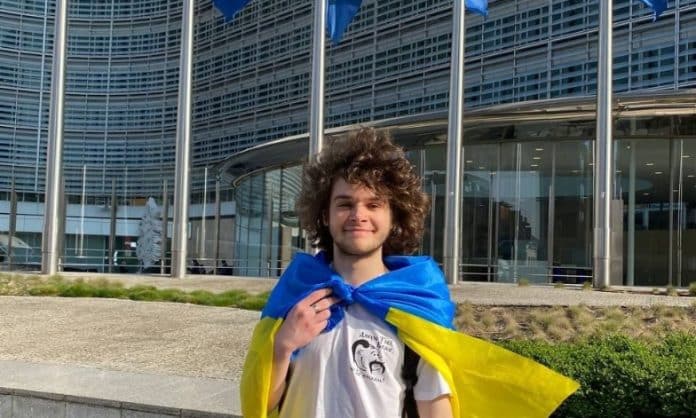At the beginning of this month, Ukrainian Children’s Day (1 June) took place. Since Russia’s full-scale invasion started in February 2022, over 1,500 children have been killed and injured in Ukraine.
The Russian invasion and war in Ukraine are inflicting untold suffering on the Ukrainian people, with profound global implications. The UN continues to call for the war in Ukraine to end now, in line with the UN Charter and international law.
To give a voice to Ukrainian young people, UNRIC interviewed 22-year-old Danylo Dugin, born in central Ukraine, who lived and studied in Kyiv until he was 13 years old.
As a young adolescent, he moved to Belgium, where he finished secondary school and started a bachelor’s in philosophy, politics and economics at Louvain-la-Neuve University. Interested in world politics and diplomacy from a very young age, it was only natural for Danylo to join his university’s Model United Nations club, LouvainMUN.
What was your primary motivation for joining Louvain’s Model United Natons (MUN)?
During my bachelor studies, my ambitions to start a political career only strengthened. I always loved to debate and wanted to develop my skills in this sphere. After joining LouvainMUN, I can admit that it is one of the best places on campus where you can practice and improve your public speaking and negotiation skills.
Also, it is a great opportunity to acquire good friends and, for sure, valuable connections for the future.
What are the activities that you undertake as part of MUN?
MUN clubs generally organise trainings that allow you to gain confidence in your public speaking, better understand global challenges and discuss them. The main activity is the simulation of United Nations assemblies.
The greatest part is that MUN is popular among young students all around the world. Hundreds of huge conferences are organised every year on every continent, and participation in them gives you an extraordinary experience of networking, debating, adopting diplomatic manners, and just having fun.
How can initiatives such as MUN help young people to influence policies and raise awareness about specific issues?
MUN conferences can prepare young people interested in politics for their future participation in real political assemblies at national and international levels. It is a great opportunity for students to have a first experience of being involved in discussing foreign affairs and crafting public policies.
A person with a MUN background will have much more confidence during their public speaking in front of national parliaments or during diplomatic negotiations. Models of the UN truly push you to leave your ideological comfort zone to consider others’ ideas and interests. To succeed, you will always be obliged to make compromises. That’s what politics is about.
Is the war in Ukraine one of MUN’s focus topics this year, or has it been before?
The Russian full-scale invasion of Ukraine in 2022 became the focus topic in the majority of institutions around the world. The war posed a fundamental challenge to the international world order, hugely impacting the situation on the geopolitical scene. It became the main subject in the UN, affected the food security of many developing countries and, of course, totally changed the external relations policies of EU and NATO members.
Since MUN is simulating international organisations and forums, it gives a lot of attention to the current global challenges and models their discussions. Therefore, the Russian aggression in Ukraine and its implications became the main topic at many MUN conferences. And even if it is less the case now, we can still feel that it plays a huge role in debates about other topics: global security, energy crisis, refugees, famines, etc.
How has the war in Ukraine affected you or your family?
Luckily, most of my relatives come from central Ukraine and Russian soldiers did not succeed to advance this far, so my family has stayed in relative safety since the invasion. However, it was not the case for a lot of other Ukrainian families who lived near Russia’s border, many of whom lost their relatives and houses under bombardments. Since February 2022, I’ve met plenty of Ukrainian refugees in Belgium and heard a lot of their tragic stories.
I do not have close family members who joined the Ukrainian Armed Forces, but my entire family, as well as the majority of Ukrainians, started to actively volunteer and donate money to support our fight for independence.
Are there any specific initiatives you want to highlight to help people in Ukraine?
The most effective and fast way to help Ukrainians is a donation, even of a small sum, to Ukrainian organisations that have experience and knowledge in helping the victims of Russia’s invasion and Ukrainian soldiers that fight against it.
I would personally recommend donating to “Plast”* – Ukrainian International Scouts who organise camps for children in Ukraine and around the world and help the victims of the war. It is essential for Ukraine’s peace and stability to form and help its future generations.
Another fund that has been very effective in supporting Ukraine’s security since Russia’s aggression in 2014 is “Come Back Alive”*. Its main mission is to save Ukrainian soldiers’ lives. Our Ministry of Defense works in close collaboration with this foundation.
*The inclusion of an organisation on the United Nations Regional Information Centre (UNRIC) website does not necessarily reflect the views of UNRIC and does not imply its endorsement.
More information:
- OCHA: Statement by the Humanitarian Coordinator for Ukraine, Denise Brown (1 June)
- OHCHR: UN human rights mission deplores child casualties in Ukraine war (1 June)
- UN News: Over 1,500 children killed or injured, concern rises over forced transfers (1 June)
- IAEA: Director General Statement to United Nations Security Council (30 May)




